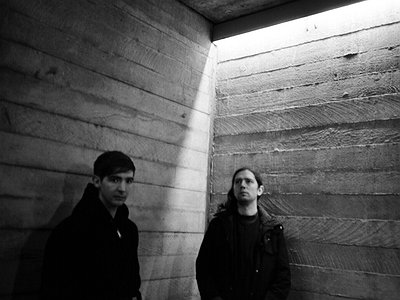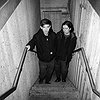Name: Circuit Breaker
Members: Edward & Peter Simpson
Nationality: British
Occupation: Producers, Sound Artists
Current Release: Hands Return To Shake on Harbinger Sound
Recommendations: Currently in London, there is an exhibition of Roger Ackling’s beautiful and playful sculptures, ’Brought to Light’ at Annely Juda. Roger was our tutor at Art School.
The Unmapped Country by Ann Quin is a new collection of short stories and ‘fragments’ from the 60’s experimental writer. The New Statesman said: “In her writing, as in her life, Quin was drawn to experiences of difference, extremity and disorientation”.
Website / Contact: If you enjoyed this interview with Circuit Breaker, check out their facebook profile and bandcamp page – or visit them on soundcloud for more music & information.
When did you start writing/producing music - and what or who were your early passions and influences? What what is about music and/or sound that drew you to it?
We are brothers, so we first began experimenting with making music together whilst still teenagers living at our parents home. Peter (older brother) had been playing in different groups on the DIY/Punk scene in Milton Keynes and Ed had just begun to come to those gigs. We decided it would be fun to have a group with just the two of us, so the use of samplers, drum machines, programming,etc was a way of compensating for the lack of more band members. At that point in our lives, we didn't have too big an interest in electronic music, but having said that, we would have been aware of artistes such as Aphex Twin, Autechre and the like. In terms of what we were listening to and trying to emulate, it would have been alternative rock stuff released on labels like Touch & Go, Load, Dischord Records, etc, etc.
One memory from that era which does stick out was hearing a John Peel session by Wolf Eyes. We caught the train up to Milton Keynes the next day and got Burned Mind on CD from HMV. Proudly announcing to our family that ‘THIS IS NOISE MUSIC’ before blasting them with the track ‘Black Vomit’. After that anything seemed possible.
There are some local gigs from that period which live on in the memory. Boston noise-rockers Neptune, who took sonic youth guitar deconstruction to a new level by building their own instruments out of scrap metal is one. Just imagine seeing something that extreme in a Bletchley leisure centre! Another one would be a newly drummer-less Ex Models who played the same jagged kraut-rocky (and mainly one note) riff for about 20 minutes with beats coming from an ipod. Everyone was shouting requests for their previous album’s math-rock tracks and eventually the performance descended into chaos.
For most artists, originality is first preceded by a phase of learning and, often, emulating others. What was this like for you? How would you describe your own development as an artist and the transition towards your own voice? What is the the relationship between copying, learning and your own creativity?
As hinted at in the previous answer, we ended up working in the manner we do almost by accident. The first gigs were very improvisatory but there would have been a loose structure or set of rules to follow. Over time, people kept telling us how cool it was that we were an ‘industrial’ band. As we only had cursory understanding of what that genre was, we went off and ingested as much of that stuff as we possibly could. The impulse was not wanting to be an outsider. We completely wanted to understand and own this categorisation. Fast forward a few years and as Ed’s use of synthesisers became more and more prominent, the same thing happened over again but this time with ‘Minimal Synth’. I think to find your own voice as an artist you have to first pass through other peoples'. The challenge really is not to get stuck there.
Nowadays even obscure stuff is throughly documented. Its much easier to gain an understanding of where your project might sit in in a musical ‘family-tree’ . When we were younger, because social media was in its infancy, recommendations were harder to come by. This was confounded even more by living in a small town, so when something like with the Wolf Eyes Peel-Session, or Neptune gig comes along, these small windows into an alternate reality can totally blow your world-view open.
What were your main compositional- and production-challenges in the beginning and how have they changed over time?
Production-wise, one ongoing challenge is how to blend the guitar with electronics. An unprocessed guitar is generally quite ‘big’ and rich sounding, whereas synthesisers, or at least how we tend to use them, are hollow, squishy, metallic, horrible,etc. Over time, we’ve arrived at being able to get a sound with which we are happy, that sits well amongst the electronics and doesn't rely too heavily on effects like guitar-synthesisers, bit crushers, ring-modulators, etc.
We began with very little formal knowledge of sound, but that didn’t stop us! Even though we would listen back to early recordings and cringe, at the time it suited our need to simply add something to the world and ultimately they were a stepping stone on the road to improvement technically and artistically.
Composition wise, as hinted at earlier, we used to be far more at home ‘jamming’, so the challenge was always how to capture the parts which worked spontaneously and then reproduce them. Luckily for us, as the band has developed, so has home recording technology. We’ve never had too much trouble cherry picking the good moments from a improvisation and then re-working them into a composition because we can record so much material.
What was your first studio like? How and for what reasons has your set-up evolved over the years and what are currently some of the most important pieces of gear for you?
We have tried to evolve in tandem with technology. The majority of our recordings have been done at home using a DAW (usually Ableton Live). We used to use a lot more hardware due to the lack of having a reliable laptop that we trusted. Also midi controllers have improved so much now that using software can feel as tactile as using a piece of hardware.
Providing the end recording is what we intend, what we have used to get there is secondary.
Hands Return To Shake features a DX7 emulation as fairly central to a lot of the tracks and at no point did we feel we needed to track down the real thing. Like everything in life, its just about getting balance between differing approaches.
Russell Haswell, (with whom we toured as part of Consumer Electronics), introduced us to Matt who runs the modular synth company ALM. This prompted a big overhaul of a lot of modules we used on the previous album, replacing them with Matt’s idiosyncratic creations, so these will likely form the basis of the next record. We’ve never felt like we needed to align ourselves with any particular ideology of equipment such as ‘analogue only” or “no computers”. Why have the unnecessary limitation?
How do you make use of technology? In terms of the feedback mechanism between technology and creativity, what do humans excel at, what do machines excel at?
We make full use of DAW software, from recording little fragments of ideas, to demo-ing songs, to recording & mixing the actual albums and delivering performances. We have fully embraced digital technology. The only things humans do better is provide a point of reference for other humans. We love the freedom of constantly being able to amend and edit midi files and quickly program soft synths. The main drawback would be that sometimes the permutations can present themselves as almost infinite. Even though they are a big part of our writing and recording, machines don’t make creative judgments on our behalf. Technology seems to work best when it augments and extends what humans are already doing.
Production tools, from instruments to complex software environments, contribute to the compositional process. How does this manifest itself in your work? Can you describe the co-authorship between yourself and your tools?
The digital environments provide plenty of means of injecting a (pseudo) random element into the processing or creating of a sound. If there was any part which could be said to be co-authored, it could be the parts where the machine ‘picks up the slack’. If we feel something either sounds stale or is uninteresting structurally, we may ‘hand over’ some kind of automation to a computer. For example, the track ‘Propulsion’ on the new record has a kind of ‘stutter’ effect on the vocals and drum track. This creates a kind of illusion that the repetitive phrases are shifting and less fixed, more fluid. However these aspects are still very precise. The parameters of the (seeming) randomness are still very deliberate,so ultimately the authorship rests with us.
Collaborations can take on many forms. What role do they play in your approach and what are your preferred ways of engaging with other creatives through, for example, file sharing, jamming or just talking about ideas?
Families don't really get to choose whether or not they collaborate in life and Circuit Breaker really is just a continuation of that. Sometimes it can feel as though there is a bit of brotherly telepathy going on. Stuff tends to just ‘click’. Because our shared experience runs so deep, loads of the boring ‘figuring out’ that is necessary when collaborating with others, can just go un-said.
That’s not to say everything is fixed. We evolve as people and so does the music. We talk a lot about music, but also other cultural stuff that has inspired us. We share everything. All the music we own digitally is stored on a cloud which we both have access to and our book and record collections are pretty fluid also. I’d say half of each other’s books and records are at the other’s flat at any given moment. Perhaps that is not so unusual and I’m sure there are good friends who have known each other for years who can gain a similar affinity, but still, being siblings is such a big part of Circuit Breaker.



